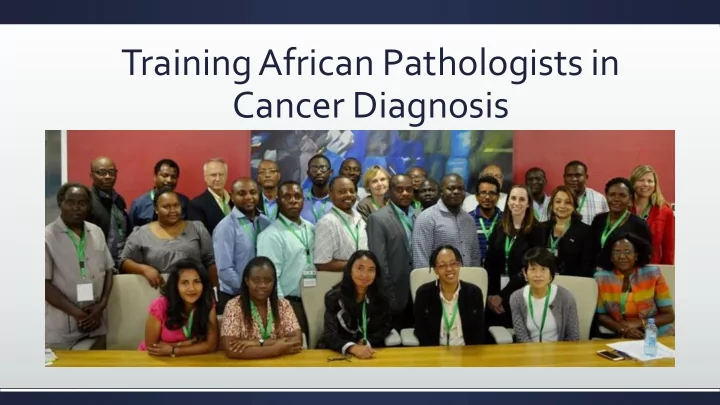

Training African Pathologists in Cancer Diagnosis
Background Following the success of our prior research conducting skill enhancement workshops with 52 pathologists from 16 different institutions in 11 countries in SSA has shown that among three training styles, including lectures, case-based training (CBT), and a blend of lectures and CBT, the blended workshop style is the most effective at engaging participants and allowing participants to retain information (Wilson, et al). This workshop series is a build on our research and will cover current best practices for processing, diagnosing, and reporting common, locally relevant cancers.
Pathology plays a critical role in guiding clinical decisions about patient diagnosis and treatment. In most low- and middle-income countries (LMICs), varying quality of pathology training and an inadequate pathology workforce limit both quality cancer diagnosis and pathologic staging of cancer. To help address this gap, robust skill enhancement and training through continuing professional development (CPD) is a critical need for the anatomic pathology workforce in sub-Saharan Africa (SSA) (Wilson, et al).
The main objective of this research is to provide a skill-enhancement opportunity to anatomic pathologists and senior residents across SSA on current best practices for processing, diagnosing, and reporting
What we did! In order to provide state of the art teaching of current best practices for processing, diagnosing, and reporting common cancers in SSA, we delivered as series of workshops in a blended short lecture model highlighting four cancers in an evidence- based format. These four cancers are: head and neck, breast, endometrial / ovarian, gastric/oesophageal
To create a sustainable infrastructure for the future development we incorporated a train the trainer model. In addition an e-learning component was incorporated which was an avenue for the participants to contact faculty for mentorship opportunity and discuss the cases further in detail.
Strategic Partners African Strategies for Advancing Pathology ( ASAP) Aga Khan University Hospital Nairobi (AKU) College of Pathologists of East Central and Southern Africa (COPECSA) Funded By: National Institute of Health (NIH)
Appendix Wilson ML, Ayers S, Berney D, Eslan A, Guarner J, Lester S, Masia R, Moloo Z, Mutuku A, Roberts D, Stall J, Sayed S. Improving anatomic pathology in sub- Saharan Africa to support cancer care. American Journal Of Clinical Pathology, 149(4), 310-315. doi: 10.1093/ajcp/aqx158 • Yarber L, Brownson CA, Jacob RR, et al. Evaluating a train-the-trainer approach for improving capacity for evidence-based decision making in public health. BMC Health Services Research. 2015;15:547. doi:10.1186/s12913-015-1224-2.
Project Schedule and Milestones 2017 Jan – Sept 2018 Sept – Oct 2018 Nov 2018 • Proposal development • Curriculum development • Participants Recruitment • Workshop delivery
Recommend
More recommend